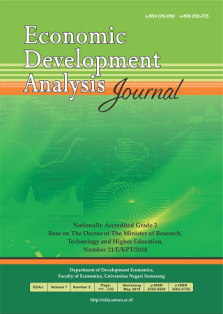Optimizing The Program Kartu Prakerja for Young Workers
Abstract
The Program Kartu Prakerja is a vital initiative in Indonesia to enhance job opportunities and quality, particularly for vulnerable individuals such as young workers. Many studies focus on unemployed individuals as research subjects. However, the real challenge is faced by the unemployed and those who are already employed. This paper investigates the program's effectiveness in enhancing employment opportunities for young workers by evaluating its impact on the probability of job retention and earnings. Using the August 2021 National Labour Force Survey (Sakernas) data, this study employs the Propensity Score Matching (PSM) method to compare the treatment group receiving the program with the control group not receiving the intervention. The findings show that the program had a significant negative impact on the probability of job retention for young participants, implying that some participants left their previous jobs in search of new ones. Another finding indicates that the program positively impacts earnings, although this impact was not statistically significant. These findings underscore the program's role as a strategic response to improving the labor market's functioning, which needs further optimization.


